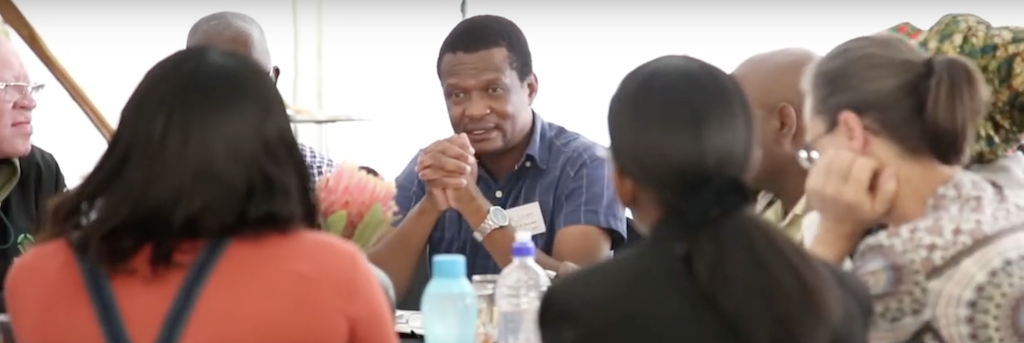Latest Resources

31 May 2018
Participatory Plant Breeding and Smallholder Farmers
The National Seed Dialogue and Celebration was hosted by the African Centre for Biodiversity at Constitution Hill in December 2017. The third video in this series, Participatory Plant Breeding and Smallholder Farmers looked at issues of smallholder farmers & seed breeding/crop improvement and the potential roles of smallholder farmers in these processes were discussed. Since […]

18 May 2018
Spiritual and Cultural Value of Seed in South Africa
Spiritual and Cultural Value of Seed in South Africa is the second video in a six part series covering discussions from the National Seed Dialogue and Celebration, an event hosted by ACB. The seed, like the big bang, or evolution, or the atom … bears the mystifying tale of a beginning. We fill our bellies […]

7 May 2018
Politics of seed in South Africa
Hosted by the African Centre for Biodiversity at Constitution Hill in December 2017, the National Seed Dialogue and Celebration honoured the role of smallholder farmers in maintaining and nurturing the diversity of seed in South Africa and regionally, who are being displaced and overridden by a growing private seed sector. The event included thought-provoking dialogues […]

14 July 2017
Call to action: make your submissions to oppose corporate seed Bills and save our seeds
The Plant Breeders’ Rights and Plant Improvement Bills restrict the saving, trading, exchanging, and sale of seed. This can have massive ramifications on seed and food sovereignty, agricultural biodiversity, access to diverse seed, and increasing the disparities and inequalities in South African agriculture, food and nutrition. We urgently need to protect and preserve our food […]

21 June 2017
Food Systems of the Future Public Talk
The ACB in partnership with Wits Inala Forum had the honour of hosting Pat Mooney, Donna Andrews, John Nzira and Stephen Greenberg at a public talk at Wits University on the 12th of May 2017, in the light of the three mega mergers taking place. The title of the talk was “Food Systems of the […]

11 November 2015
#GlyphosateMustFall
The South African government needs to ban the use of glyphosate in our food system with immediate effect. Glyphosate (most commonly known as RoundUp) is the most widely used herbicide in South Africa and its use has increased dramatically since the introduction of genetically modified maize, soya and cotton that has been engineered to survive […]

20 March 2015
Get Involved
You Can make a difference by keeping the pressure on food producers. Consumer pressure works… Especially if it is constant and relentless… We have won many victories and we can win the big ones too. Consumers have the power! Let’s take back our food supply… Please sign our petition to call on South African food […]

23 July 2013
Call for Parliamentary hearing on GMOs
Call for urgent Parliamentary hearing on Genetically Modified Organisms (GMOs) and transparent review of risk assessment procedures and public participation in GMO decision making To Mr. Mlungisi Lulu Johnson Chair: Portfolio Committee on Agriculture Parliament of South Africa Dear Honourable Mr Johnson, Recent events, such as the nationwide protests against Monsanto and consumer outrage over […]

6 May 2013
Civil society petition to Tiger Brands t/a Purity
Outraged by the results of tests conducted by the ACB. We, the undersigned members of civil society, are outraged by the ACB’s test results showing that Purity’s Cream of Maize tested positive as containing 56.25% GM maize; and Purity’s Purity Baby First tested positive as containing 71.47% GM maize. We note with alarm, that this […]

29 October 2012
African Civil Society Statement: Call for a ban on GMOs
We, the undersigned, members of civil society organisations from across the African continent, hereby call for an immediate and complete ban on the growing, importing and exporting of genetically modified organisms (GMOs) on the African continent. We call upon the governments of Africa to take the necessary steps to protect the health of their populations […]
